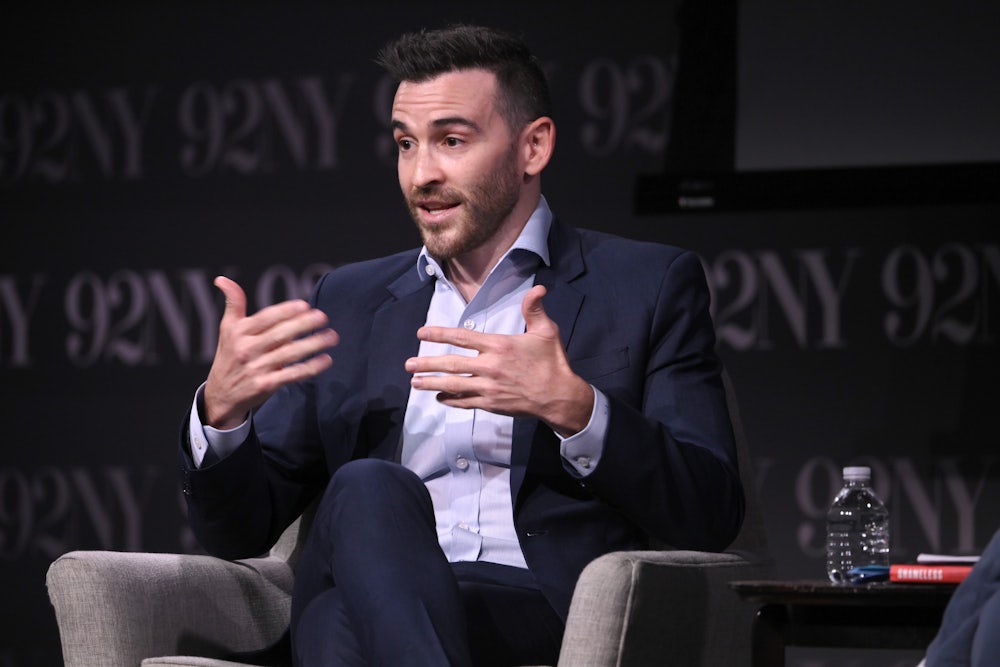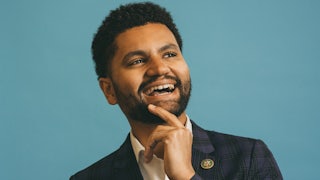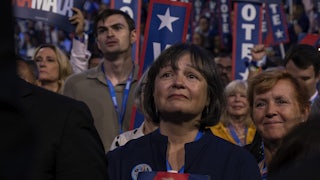It’s been a tale of two conventions for credentialed media at this week’s Democratic National Convention. At the United Center in Chicago, news media outlets have been full of complaints about smaller workspaces and limitations on press access—especially compared to last month’s Republican National Convention in Milwaukee.
There’s a reason for all the grousing. Press space tightened up considerably after Democrats created a new category of broadcasters and invited them to their shindig: independent content creators, who have become a top priority for Peter Velz, the Chicago convention’s media logistics coordinator—and a longtime Kamala Harris aide—and his team of aides and volunteers.
The move may be controversial for members of the legacy media, but Velz can point to some tangible dividends. Creators for Kamala, a group of over 200 prominent digital content producers at the DNC, collectively reached a domestic audience of 30 million on Monday—a staggering figure in an election where “reaching people where they are” has become a ubiquitous phrase among press and operatives.
“It’s beautiful to see,” said Nancy Pelosi of the creators program. “I’m so glad they’re here.” Creators for Kamala is the brainchild of the Harris campaign’s rapid response director Rob Flaherty who has been working since January on the influencer program.
“We have unprecedented access,” said creator Brian Tyler Cohen, 35, host of a politics channel on YouTube with over 3.1 million followers. “It’s been great. I can’t complain about anything,” he said of the DNC.
Oregon Senator Ron Wyden of the Harris campaign added that he believes creators will be a part of the Democratic Party’s programming moving forward. “It has to be,” Cohen agreed. “That’s where more and more people are getting their news from. That’s where the eyeballs are. That’s where the ears are. So you have to follow the people if you want to reach them where they are,” he said.
Mo Elleithee, a former DNC communications director under whom Flaherty worked as an intern, said audiences “don’t need the press to be the filter that it once was.” The creators program, he continued, “is innovative but also essential to finding audiences where they are and communicating to them in the voices that they know.”
To Elleithee, now the founding director of Georgetown University’s Institute of Politics and Public Service, the quest for news audiences doesn’t necessarily pit creators and the press against each other. “I don’t think it’s so much a question of replacing as it is about augmenting. Reporters are still critically important, but you’re not the only filter,” he said.
“I don’t really think about legacy media. I just think about doing my thing and reaching my audience,” said Cohen, who is scheduled to interview Transportation Secretary Pete Buttigieg at the convention on Thursday. Cohen, whose audience knows him as a fiercely independent progressive broadcaster, said that he doesn’t see himself as a vessel for Democratic Party messaging.
“I’m not working with them in the sense that there’s any cooperation. I’m working on them in the sense that I’m here, that we’re all allowed to be here. I think the audience appreciates the fact that we have access so we can bring people news where they actually get their news,” he said.
For their part, the Chicago convention’s media logistics team is not policing the creators or their content. Creators come and go as they please and are welcome to speak on the record with the press.
Briefing documents obtained by TNR by a firm called Palette Media, are available to creators with content ideas (Concept: Demure … Clips of you meeting surrogates, “you see how I meet ____, very demure”) and polite suggestions for amplifying party messages (“Feel free to mention issues that are important to her like reproductive rights … also include items that humanize her – she worked at McDonald’s while attending college”).
Creators insist that they are not paid by the DNC, though the convention offered to pay at least some of the five creators—Deja Foxx, Nabela Noor, Carlos Eduardo Espina, Olivia Julianna, and John Russell—a speaking fee for remarks they will deliver on the main event stage. [The New Republic profiled Cohen, Espina, and Julianna in April as part of our “25 Influencers to Watch in 2024” package.]
But there are other perks of being a creator akin to sponsorship that would be beyond the pale for most newsroom ethics guidelines—like three luxury penthouse suites and two lounges at the United Center, all stocked with food, booze, coffee, and boxes of lemon vanilla bean sugar cookies showing the faces of Harris and her running mate, Minnesota Governor Tim Walz.
The divergence of vibes couldn’t be more visible than at the penthouse level, where the news broadcaster spaces where CBS, Univision, and The Washington Post, among others, reside, are sober and sterile as teams of producers float around with huge network cameras filming on-air hosts and political contributors.
By contrast, in the creator suites, free beer and ring lights are the vibe. United Center decor in one suite has been papered over by a poster of Harris with pop star Olivia Rodrigo. Boxes of iPhone 15 Pros, wireless microphone kits, and selfie sticks (prohibited by the U.S. Secret Service) are stacked in the cupboards, available for creators if they need (or want) one. Welcome back to the Democratic National Convention.
Print press, tragically, has been relegated to the lowest end of convention real estate, a semi-air-conditioned tent in the United Center parking lot where storied news institutions like The Associated Press work from 49 picnic tables covered in cookie crumbs and taffy wrappers. Reporters pay $7 for Frappes, $5 for Lattes from a food truck called Travelin Tom’s Coffee outside the sweaty press tent.
Back inside the convention hall on Wednesday morning, MSNBC host Chris Jansing recorded a stand-up about the Creators for Kamala. “If you wanna know how important someone is to the campaign, look at where they’re sitting in this room,” she said, standing on the creator’s platform on stage left, a bright, shiny, highly visible stage for the new stars of Democratic media.
After Jansing finished her stand-up, she asked her team of two cameramen and two producers to film her for TikTok. “It’s only 60 seconds!” she exclaimed to her visibly exasperated team. “Come on guys, we got this!”








